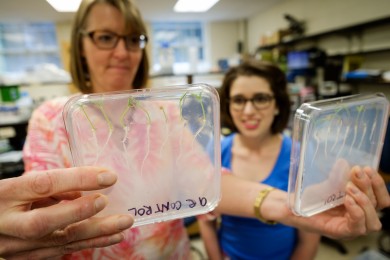Tomorrow’s tomatoes look to the past
The key to developing drought-resistant tomatoes may be hidden in the genes of their ancestors.
Kathleen DiNapoli is on a hunt to find it.
Peering through the lens of a microscope in the basement of Wake Forest’s Biology building, DiNapoli, a rising junior, and biology professor Gloria Muday are examining the genomes of common agricultural tomatoes, Lycopersicon esculentumn (Le) that have had a portion of their DNA swapped out with that of their more drought-resistant ancestors, L. pennellii (Lp).
The two researchers, along with post-doctoral research Greg Maloney, are looking for specific regions of ancestral DNA that when bred into the cultivated tomato lines lead to increased lateral root growth, more root hairs, and production of antioxidant compounds called flavonoids.
Their hope is that identifying ancestral genes that offer growth advantages will help scientists breed tomatoes with the ability to cope with drought conditions and other dynamic environmental stressors.
“The world population continues to grow despite our finite sources of agricultural land and compounding this, global climate change is limiting the amount of land that is suitable for plant growth,” DiNapoli said. “If we are able to understand how these genes from ancestral tomatoes function on a molecular level, we may be able to breed plants that would grow more successfully in different climates.”
Beckman Award
The prestigious Arnold and Mabel Beckman Foundation will provide funding for DiNapoli’s research.
Established in 1997 by the famed scientific innovator and inventor Arnold O. Beckman, the Beckman Scholars Program provides exceptionally talented scholars at select universities with funding to pursue research and training in the fields of chemistry, biochemistry, physics and the biological and medical sciences.
Wake Forest was one of 12 universities selected for this year’s Beckman Scholars Award from a competitive field of applicants.
Rebecca Alexander, chemistry professor and co-director of the Undergraduate Research and Creative Activities (URECA) Center, chaired the selection committee that selected DiNapoli as one of Wake Forest’s first two Beckman scholars.
“The Beckman Scholars Program will further enhance our undergraduates’ preparation for top science graduate programs,” Alexander said.
The Beckman program will provide DiNapoli funding to conduct research for 15 months. In addition, DiNapoli will be presenting results from her experiments at the American Society of Plant Biologists annual meeting in Portland this August, where she will also be honored as a Summer Undergraduate Research Fellow.
Muday said the Beckman scholarship will give DiNapoli the chance to get an immersive research experience that is otherwise hard to come by.
“Learning how to conceptualize an idea into a research experiment, developing the rights controls and then collecting data takes a full summer,” she said. “The idea that Kathleen will have the time and funding to put her experiment together, collect results and then analyze them in the form of a paper is a fantastic opportunity for an undergraduate.”
DiNapoli said she is excited to be doing research as an undergraduate that might play into a future career after college.
“There is a lot of research being done across the country in the area of plant root development,” she said. “My plans are to attend a PhD program after I graduate and it is exciting to think I am working on something now that will help me land a job doing something I love after I graduate.”
Read about DiNapoli’s efforts to establish an after school STEM club for girls at a local middle school.
Categories: Environment & Sustainability, Experiential Learning, Leadership & Character, Research & Discovery
Media Contact
Wake Forest News
media@wfu.edu
336.758.5237




